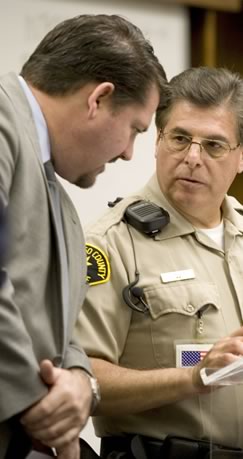Sex Crimes & Stalking Division
The Sex Crimes and Stalking Division is comprised of a highly-trained and specialized team of Deputy District Attorneys, District Attorney Investigators, paralegals and secretaries dedicated to aggressive and just prosecution of perpetrators of sexual assault and stalking crimes. Guided by Division Chief John Rice and Assistant Chief Kristen Spieler, the division strives to treat the victims of sexual assaults with compassion, dignity, and respect.

Attorneys and staff in this division handled numerous significant cases including prosecutions for sexually motivated homicide; sexual assaults by strangers, acquaintances or family members; lewd acts with children; stalking; human trafficking; pimping; pandering; failing to properly register as sexual offenders; indecent exposure and civil commitments of sexually-violent predators.
We continue to see a rise in the prosecution of human trafficking, primarily in conjunction with pimping and pandering charges. Felons intent on profiting from this illicit business seduce vulnerable young women and minors into the underworld of prostitution throughout the county. The division not only prosecutes offenders, but it works with law enforcement and community-based organizations, which try to rehabilitate the victims and re-integrate them back into society.
The division is committed to protecting the community from sexually-violent predators through the pursuit of civil commitment petitions resulting in hospitalization and treatment of those offenders found to be a substantial danger to the public. The division works to keep the public safe and informed as sexually-violent predators reach the community treatment phase through community notification and public meetings.
Significant cases in 2012 included:
People v. Adrian Avena and Juan Perez
Two defendants entered an AutoZone store at closing time and confronted the manager and female clerk at gunpoint. The defendants locked the doors and forced the victims into the back room. Avena and Perez took the victims' personal property and money in the cash registers. Perez took the manager into his office; pistol whipped him and threatened to kill him in an effort to force him to open the safe. While Avena and the female are alone in the back room, Avena tied her up and raped her. After they left AutoZone, the defendants carjacked a vehicle from a teenage boy. The police pursued the pair at high speeds until the vehicle ended up with a flat tire and both suspects were captured after a foot pursuit. Perez pleaded guilty and received a 17-year prison sentence. Avena pleaded guilty and was sentenced to 35 years- to-life.
People v. Leonel Contreras and William Rodriguez
In this case, two teenage girls were at a park near their home when the two juvenile defendants, Contreras and Rodriguez, approached the victims wearing hoodies and bandanas over their faces. The defendants took the girls at knifepoint across the street to a secluded area up an embankment where they sexually assaulted both girls. The assault ended when family members of the victims began to search the park calling out the girls' names. The two defendants threatened the girls with more harm if they reported the assault then fled the scene. Rodriguez was initially identified through graffiti found at the scene. Contreras was seen by family members with Rodriguez both before and after the assaults. Both defendants were convicted after a jury trial and are facing the maximum sentences available for juveniles tried as adults for non-homicide offenses.
People v. Corey Peery
The victim in this case is a bright, motivated musician and athlete who went to the University of San Diego as a freshman in fall of 2009 on partial academic scholarship. She met Peery her freshman year and secretly married him in March 2010. She failed out of USD and severed ties with her family two months later and told them she was not coming home for the summer. The victim's family learned that the victim was posted on the internet for prostitution and contacted authorities. Police set up a sting and negotiated with Peery for sexual acts with the victim. Peery was charged with pimping, offering his wife up for prostitution. He was sentenced after trial to four years in prison.
People v. Ramiro Tapia
The victim came to the U.S. from Mexico in 2005 when she was 16 and lived with her maternal uncle, Mr. Tapia, and his family. The victim began working with Tapia at a horse ranch. The victim suffered inappropriate touching and sexual harassment from Tapia on numerous occasions beginning shortly after she began living with him. The acts culminated in a forcible rape. The victim moved out on her own and began working and supporting herself by cleaning homes. Several months later Tapia invited her to what was supposed to be a family gathering, but he was alone and forcibly raped her again. The defendant was convicted after a jury trial of multiple counts of forcible rape and incest. The defendant was sentenced to nine years in state prison.
People v. Sam Consiglio, Sexually-Violent Predator Civil Commitment
Consiglio was previously convicted of rape in two separate cases. His acts included rape, oral copulation and sodomy of two victims. The People filed a civil commitment petition requesting that he be adjudged a sexually-violent predator and committed to the Department of State Hospitals. Consiglio was the subject of the 2000 novel, With Consciousness of Guilt, The Sexual Predator Among Us. The Author testified during the commitment trial regarding his interviews with Consiglio in preparation for writing the book. Additional victims were located who also testified during the commitment trial. The Court found Consiglio to be a Sexually-Violent Predator and he is presently committed to Coalinga State Hospital for an indeterminate term.
People v. Richard McKee
In a continuing equal protection challenge to the indeterminate commitment of sexually-violent predators, the Fourth District Court of Appeals, Division One, ruled on July 24, 2012, in a published decision, that sufficient evidence was presented at a 2011 evidentiary hearing to support treating sexually-violent predators differently than other similarly situated civil commitments. Richard McKee appealed that ruling and on October 21, 2012 the California Supreme Court denied his petition for review. All pending cases with proceedings suspended on the equal protection issue were subsequently reinstated and indeterminate commitment terms were reimposed.

